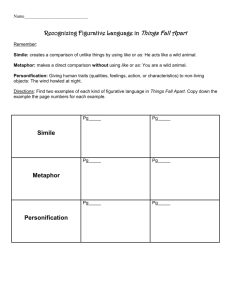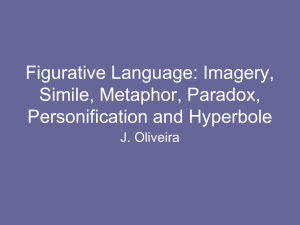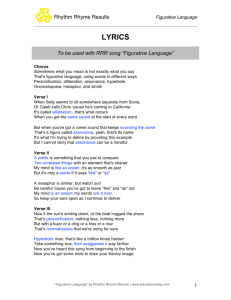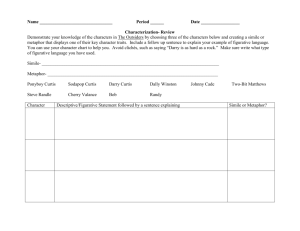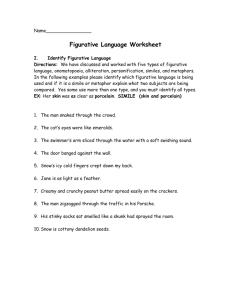Figurative language handout
advertisement
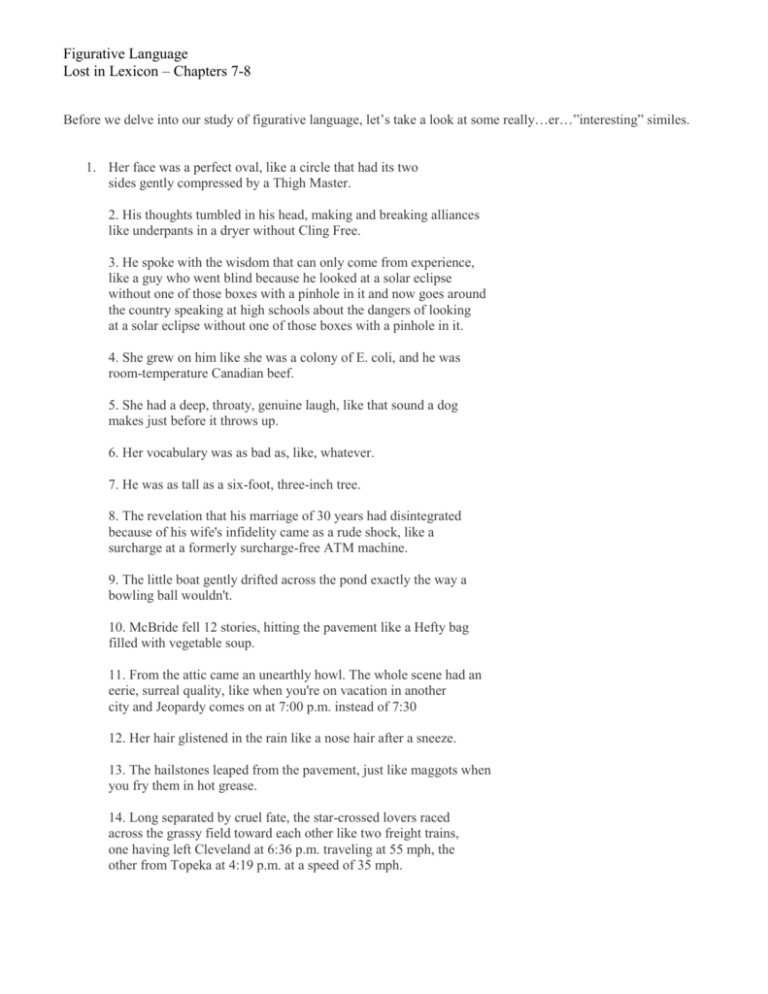
Figurative Language Lost in Lexicon – Chapters 7-8 Before we delve into our study of figurative language, let’s take a look at some really…er…”interesting” similes. 1. Her face was a perfect oval, like a circle that had its two sides gently compressed by a Thigh Master. 2. His thoughts tumbled in his head, making and breaking alliances like underpants in a dryer without Cling Free. 3. He spoke with the wisdom that can only come from experience, like a guy who went blind because he looked at a solar eclipse without one of those boxes with a pinhole in it and now goes around the country speaking at high schools about the dangers of looking at a solar eclipse without one of those boxes with a pinhole in it. 4. She grew on him like she was a colony of E. coli, and he was room-temperature Canadian beef. 5. She had a deep, throaty, genuine laugh, like that sound a dog makes just before it throws up. 6. Her vocabulary was as bad as, like, whatever. 7. He was as tall as a six-foot, three-inch tree. 8. The revelation that his marriage of 30 years had disintegrated because of his wife's infidelity came as a rude shock, like a surcharge at a formerly surcharge-free ATM machine. 9. The little boat gently drifted across the pond exactly the way a bowling ball wouldn't. 10. McBride fell 12 stories, hitting the pavement like a Hefty bag filled with vegetable soup. 11. From the attic came an unearthly howl. The whole scene had an eerie, surreal quality, like when you're on vacation in another city and Jeopardy comes on at 7:00 p.m. instead of 7:30 12. Her hair glistened in the rain like a nose hair after a sneeze. 13. The hailstones leaped from the pavement, just like maggots when you fry them in hot grease. 14. Long separated by cruel fate, the star-crossed lovers raced across the grassy field toward each other like two freight trains, one having left Cleveland at 6:36 p.m. traveling at 55 mph, the other from Topeka at 4:19 p.m. at a speed of 35 mph. Figurative Language Lost in Lexicon – Chapters 7-8 15. They lived in a typical suburban neighborhood with picket fences that resembled Nancy Kerrigan's teeth. 16. John and Mary had never met. They were like two hummingbirds who had also never met. 17. He fell for her like his heart was a mob informant, and she was the East River. 18. Even in his last years, Granddad had a mind like a steel trap, only one that had been left out so long, it had rusted shut. 19. Shots rang out, as shots are wont to do. 20. The plan was simple, like my brother-in-law Phil. But unlike Phil, this plan just might work. 21. The young fighter had a hungry look, the kind you get from not eating for a while. 22. He was as lame as a duck. Not the metaphorical lame duck, either, but a real duck that was actually lame, maybe from stepping on a land mine or something. 23. The ballerina rose gracefully en Pointe and extended one slender leg behind her, like a dog at a fire hydrant. 24. It was an American tradition, like fathers chasing kids around with power tools. 25. He was deeply in love. When she spoke, he thought he heard bells, as if she were a garbage truck backing up. Figurative Language Lost in Lexicon – Chapters 7-8 Stop me if you’re stuck! This stuff is dragging me down! I am completely lost! Have you ever noticed how we talk in figurative language all the time? For instance, when your teacher is explaining a tricky concept to you, she may say, “Stop me, if you get stuck.” Obviously, she doesn’t mean that a new grammatical concept or math equation could actually have the power to adhere you to a surface. Instead, she is using the idea of being actually “stuck” as a metaphor for temporary intellectual confusion. Likewise, if you say you are “lost” in a class, it doesn’t mean that you need a GPS or Google Maps. Metaphors and Similes From our study of Tuck and Seedfolks, you already know what similes and metaphors are. In the spaces below, write a definition of metaphor and simile. Then, write an example of each one from Lost in Lexicon. Make sure to put the page number after your quote. METAPHOR: _____________________________________________________________________________________ _____________________________________________________________________________________ _____________________________________________________________________________________ SIMILE: _____________________________________________________________________________________ _____________________________________________________________________________________ _____________________________________________________________________________________ The Mistress of Metaphor introduces us to other forms of figurative language: cliché, hyperbole, and sarcasm (also known as irony). As the Mistress points out to Daphne, figures of speech can make language much more colorful, but they can also be dangerous in careless hands. CLICHÉ: an overused, trite, hackneyed, overly-familiar phrase or saying (e.g. it’s raining “cats and dogs”) What is the clichéd simile that Daphne uses to describe the way in which the Mistress of Metaphor and her thesaurus left her sisters, Hyperbole and Sarcasm? Figurative Language Lost in Lexicon – Chapters 7-8 What simile does the Mistress of Metaphor replace Daphne’s clichéd simile with? HYPERBOLE: an exaggeration used for dramatic impact or effect (e.g. That test was the worst thing that ever happened to me.) Describe the following activities using hyperbole and another figure of speech: Skiing a black diamond trail _______________________________________________________ Playing your ukulele in front of the entire school _______________________________________ Waking up for school each day _____________________________________________________ SARCASM: a type of verbal irony where the actual meaning of the words used is contradicted by the speaker’s intended meaning (e.g. When a mother walks into a room and sees that her children, instead of doing their homework, are playing video games, she gives them a stern look and says, "Once you're done with your very important work there, let's take some time out for recreation in the form of some math problems.") Consider what you think about the following questions: What are some occasions in which people tend to use sarcasm? ____________________________ When can sarcasm be funny? _______________________________________________________ When can it be hurtful? ___________________________________________________________ Figurative Language Lost in Lexicon – Chapters 7-8 Now, with your partner, try to guess what is being metaphorically, or figuratively, described in the following poems. Try to guess the titles and identify other figures of speech within each poem. ____________________________ I'm a riddle in nine syllables, An elephant, a ponderous house, A melon strolling on two tendrils. O red fruit, ivory, fine timbers! This loaf's big with its yeasty rising. Money's new-minted in this fat purse. I'm a means, a stage, a cow in calf. I've eaten a bag of green apples, Boarded the train there's no getting off. Sylvia Plath ____________________________ Green Buddhas On the fruit stand. We eat the smile And spit out the teeth. Charles Simic ______________________________ Out of Green space, A sun: Bright for A day, burning Away to a husk, a Cratered moon: Burst In a week To dust: Seeding The infinite Lawn with Its starry Smithereens. Valerie Worth Figurative Language Lost in Lexicon – Chapters 7-8 ____________________________ I am silver and exact. I have no preconceptions. Whatever I see, I swallow immediately. Just as it is, unmisted by love or dislike I am not cruel, only truthful – The eye of a little god, four-cornered. Most of the time I meditate on the opposite wall. It is pink, with speckles. I have looked at it so long I think it is a part of my heart. But it flickers. Faces and darkness separate us over and over. Now I am a lake. A woman bends over me. Searching my reaches for what she really is. Then she turns to those liars, the candles or the moon. I see her back, and reflect it faithfully She rewards me with tears and an agitation of hands. I am important to her. She comes and goes. Each morning it is her face that replaces the darkness. In me she has drowned a young girl, and in me an old woman Rises toward her day after day, like a terrible fish. Sylvia Plath
